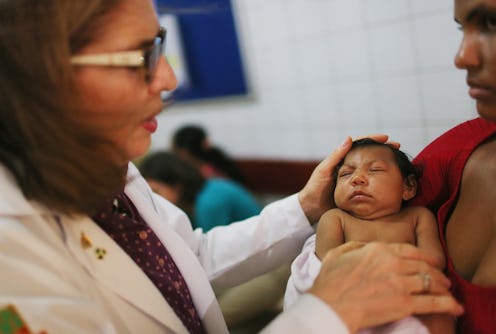News
Microcephaly Is Linked To The Zika Virus
An outbreak of the mosquito-borne Zika virus has affected people across parts of South America, Central America, the Caribbean, and Mexico since the first recent case was confirmed in Brazil in May. It's not the severity of the illness, however, that has sparked serious concern for those at risk of becoming infected. In the context of the Zika outbreak, it's actually a rare condition known as microcephaly that is worrying both the Centers for Disease Control and national leaders. So what is microcephaly and how is it linked to Zika?
Microcephaly is a neurodevelopmental disorder in which a baby is born with a head that's much smaller in size than the average child's. A newborn baby is typically diagnosed with the condition if the head's circumference is in the lowest 3 percent of infants who are the same age and sex. The condition is fairly uncommon: tracking systems for birth defects estimate microcephaly appears in between 2 babies per 10,000 live births to 12 babies per 10,000 live births in the United States, according to the CDC.
The small head size would not necessarily be cause for concern, but the reason behind the defect is for health care professionals and families alike. Infants who are diagnosed with microcephaly can exhibit the defect because the brain did not develop fully during the pregnancy or, for those diagnosed at a later age, ceased to develop after birth.
And with this decreased level of brain development, a baby's head does not experience the same kind of growth seen in other infants. As a result, a child with microcephaly can experience developmental delays in speech and movement, a decreased ability to learn, seizures, and issues with vision and hearing, among other problems.
Where researchers are seeing a connection between Zika and microcephaly is in the high number of pregnant woman who were infected with the virus during early pregnancy and who went on to deliver babies with the rare disorder. In Brazil alone, the condition is thought to have affected thousands of infants. As a preventative measure, government officials in Brazil, Colombia, and El Salvador have encouraged women to avoid pregnancy while the outbreak is ongoing.
Researchers have yet to prove that a Zika infection likely leads to delivering a child with microcephaly, so the connection remains only a possibility at this point. And if scientists do confirm a link between the two, they must also still determine whether the Zika virus would lead to the same kind of developmental issues later in childhood for those diagnosed with the disorder.
"The researchers will be able to look at their children and see if they are meeting their developmental milestones," infectious disease specialist Dr. Frank Esper told ABC News. "I expect that in 2016, we will have a better idea about what it means for the child."
